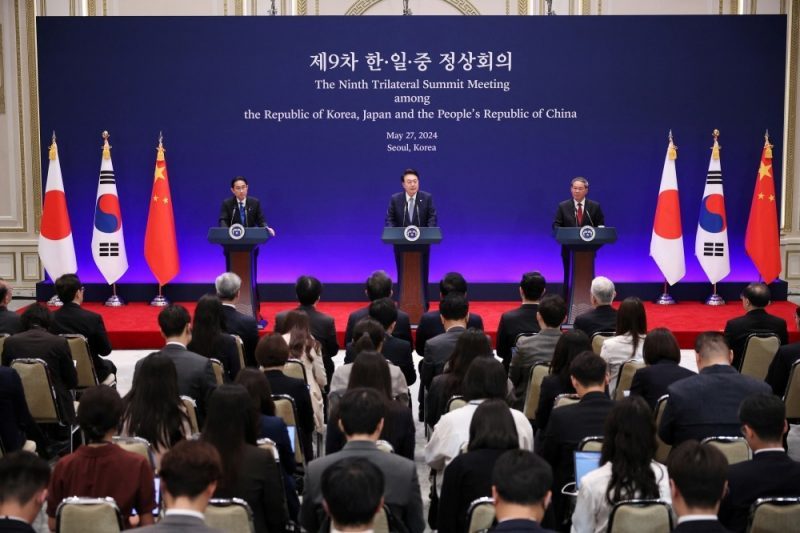China has sought to improve ties with two of its close neighbours in North Asia – Japan and South Korea, who are both security allies with the United States.
China’s Premier Li Qiang has adopted a friendly stance in a bid to warm relations with Tokyo and Seoul, spearheading talks with their leaders at the first three-way summit in four years. Beijing wants to revive trade and security dialogues hampered by global tensions.
The Chinese premier met South Korean President Yoon Suk-yeol and Japanese Prime Minister Fumio Kishida in Seoul with efforts to revitalise negotiations on a three-party free-trade agreement, which have stalled since 2019, high on the agenda.
ALSO SEE: North Korean Rocket Carrying Satellite Explodes After Launch
As the summit opened, Li said the talks were “both a restart and a new beginning” and called for the comprehensive resumption of co-operation between East Asia’s economic powerhouses.
But for this to happen politics should be separated from economic and trade issues, he added, calling for an end to protectionism and the decoupling of supply chains.
“For China, South Korea, and Japan, our close ties will not change, the spirit of cooperation achieved through crisis response will not change and our mission to safeguard regional peace and stability will not change,” Li said on Monday.
A joint declaration released after the meeting called for China, Japan, and South Korea to formalise more regular communication at the highest levels, and collaborate on climate change, conservation, health, trade and international peace, among other areas.
Progress despite suspicion, distrust
Regardless of any agreements signed during the talks, the meeting itself is being seen as a mark of progress in relations between three countries whose relations are marked as much by suspicion and rancour as constructive engagement.
China and US-allied South Korea and Japan are trying to manage mutual distrust amid the rivalry between Beijing and Washington, tensions over democratically ruled Taiwan, which China claims as its own, and North Korea’s nuclear programme.
Yoon and Kishida have charted a closer course with each other and to Washington, embarking on unprecedented three-way cooperation with the United States on military and other measures.
US President Joe Biden has raised barriers to Chinese imports, hiking tariffs on an array of Chinese imports including electric vehicle batteries and computer chips.
Donald Trump, his rival in the November presidential election, has floated tariffs of 60% or higher on all Chinese goods.
On North Korea, Yoon and Kishida called on Pyongyang not to carry out a planned rocket launch carrying a space satellite, which they say uses ballistic missile technology banned by United Nations Security Council resolutions. (The rocket launched late on Monday night exploded – see the link above).
Li called for all parties to practise restraint and prevent further complication of the situation on the Korean peninsula.
China is North Korea’s only military ally, its largest trade partner, and along with Russia, has called for UN sanctions on North Korea to be eased.
The trade relationship between China, South Korea and Japan has evolved over the past decade to become increasingly competitive.
Yoon said the leaders agreed to build a transparent and predictable trade and supply chain environment, but did not elaborate.
Monday’s summit came a day after the leaders met separately for bilateral talks with each other.
In those meetings, Li and Yoon agreed to a diplomatic and security dialogue and resume free-trade talks, while Kishida and the Chinese premier discussed Taiwan and agreed to hold a new round of bilateral high-level economic dialogue.
Analysts say it’s all about China’s key goals – Taiwan and computer chips.
- Reuters with additional input and editing by Jim Pollard
ALSO SEE:
China Unveils Video of Simulated Invasion of Taiwan
South Korea to Resume Talks With China on Trade Deal, Security
As Korea Mulls Joining US Chip War, China Says ‘Don’t Give In’
China Voices Concern Over US Chip Curbs, Cloud Moves, Tariffs
US, S Korea, Japan Team Up to Confront N Korea Cyber Threat
Camp David Summit Signals New Cold War, With China – Observer
North Korea Declares Itself a Nuclear State, Vows More Missiles
Competition in Chip Industry an ‘All-Out War’, South Korea Says
Samsung to Pump $230 Billion Into ‘World’s Largest Chip Base’
























